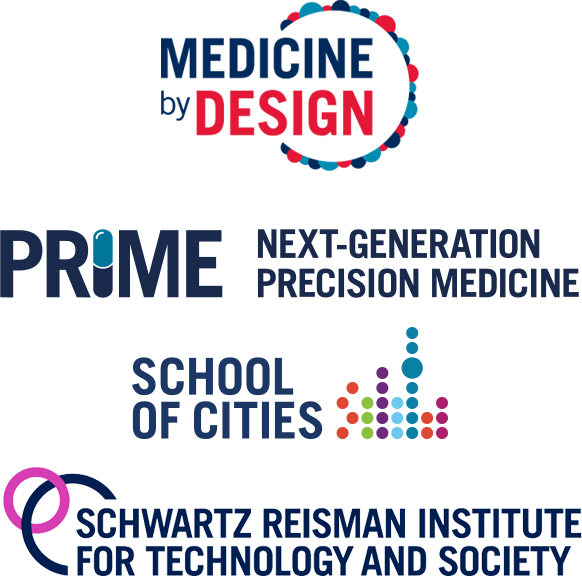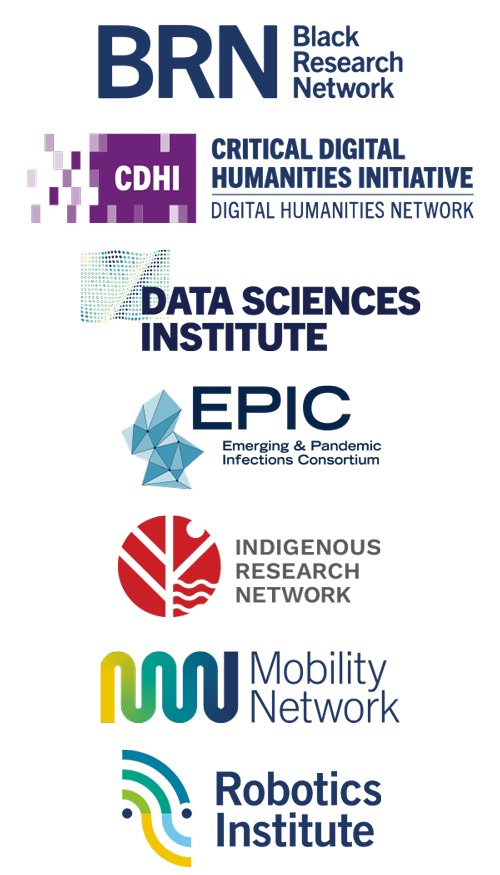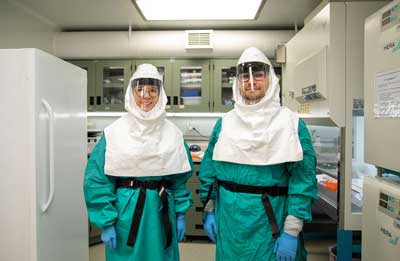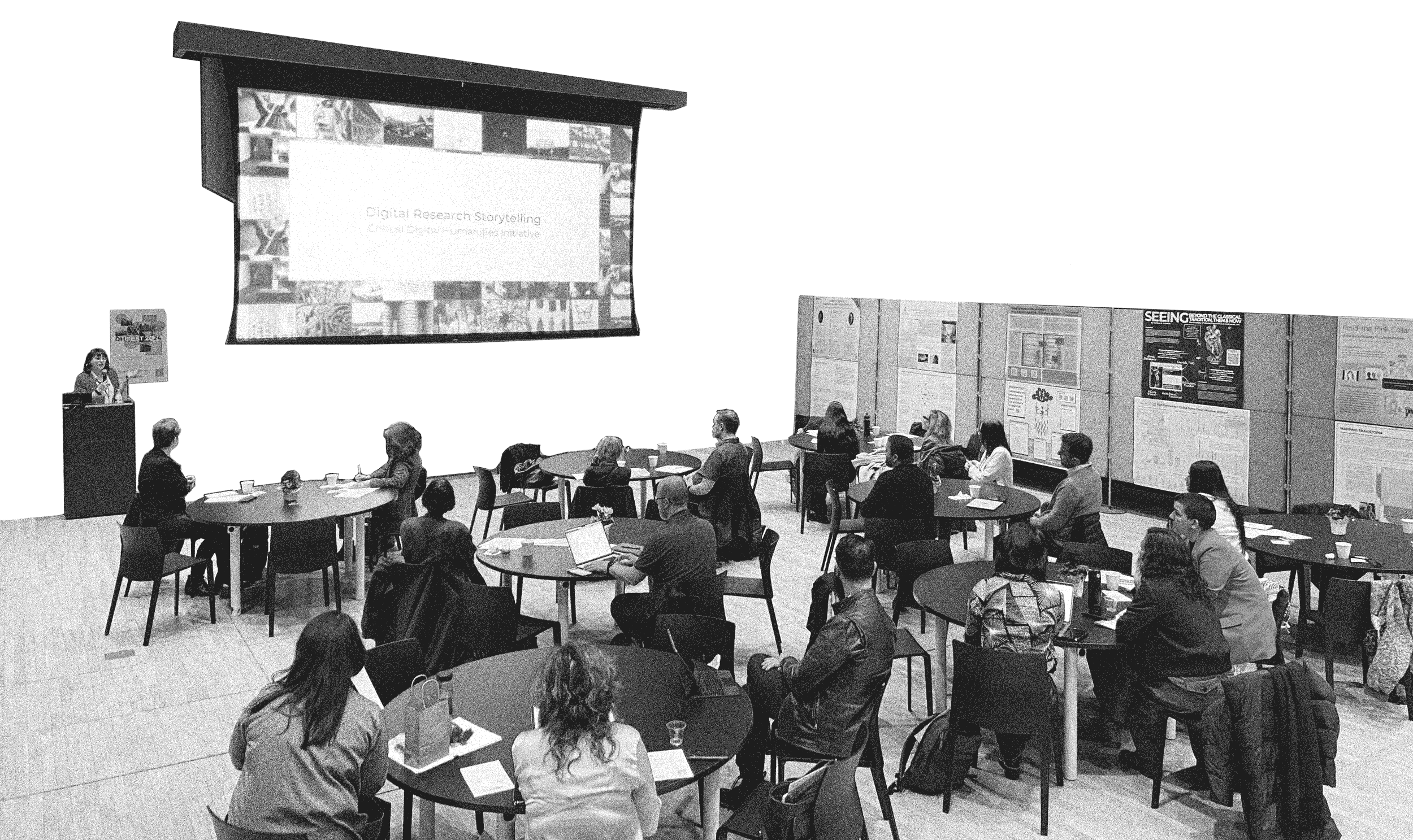
Interdisciplinary research excellence
The University of Toronto’s Institutional Strategic Initiatives (ISIs) are rooted in a simple, yet powerful idea — by building large-scale interdisciplinary research networks, we can foster the collaboration needed to solve the world’s most complex problems.
Since 2019, 22 ISIs have been launched at U of T. This number includes both pre-existing initiatives that joined the portfolio and new initiatives, three of which reflect Provostial priorities in student mental health, Black research excellence, and Indigenous research excellence. The ISIs cover diverse subjects including human health, climate change, urban infrastructure and mobility, artificial intelligence, robotics, data science, and the digital humanities. Our office has also supported the development of nascent initiatives in quantum technologies and social justice. We have become a laboratory for collaboration and an acceleration space in the university, providing structure and support to propel interdisciplinary research excellence.
ISIs have had a broad impact—in research, innovation, and policy—with wide-reaching benefits for students, researchers, industry, and the public. They are advancing the fight against cancer, creating new carbon-capture technology, and developing tools to support decision-making for the housing crisis.
They are bringing social justice to equity-deserving groups, creating pandemic-ready testing facilities, and developing new drugs and transplant procedures. As a magnet to attract resources to the university, ISIs have secured some of the largest research grants in Canadian history. Indeed, the portfolio was given the ambitious goal of attracting $300 million in external funding by 2024, a figure the ISIs have collectively surpassed. As of April 2024, the ISI portfolio has secured $490 million in total external funding.
We extend our thanks to all the people inside and outside the university that have made these achievements possible: students, faculty, staff, industry and hospital partners, and donors as well as our collaborators from U of T’s academic divisions who are participating in the ISIs. We would also like to thank our collaborators from the Offices of: the Vice-President, Research and Innovation; Vice-President and Provost; Vice-President, International; Government Relations; Communications; University Advancement; and People Strategy, Equity and Culture.
Here, we showcase just some of the many remarkable stories from the ISIs and the related initiatives we support. We hope that as you read about the people who make up our interlinked communities and learn about the difference they are making in the world, you will feel the same sense of pride that we feel in being part of these ambitious initiatives.


The creation of the Institutional Strategic Initiatives Office (ISI Office) and the ISI portfolio stem from a consultation process that took place in 2018, when faculty and university leadership took a close look at the institution’s research collaboration potential.
They wanted to support the development and sustainability of large-scale, cross-divisional, and interdisciplinary initiatives, but acknowledged that the size and complexity of the institution made this difficult. What was needed was a dedicated space, where initiatives with the greatest potential to act on the most pressing social, economic, political and environmental issues could be quickly identified, tested, and grown, ensuring that strategic institutional investment could have the most impact.
The ISI Office was created in 2019 to drive this goal: to coordinate university resources, facilitate relationship building, and serve as a connection hub that incubates, catalyzes and supports high-impact research spanning disciplines and academic divisions.
Through the ISI Office, and in collaboration with colleagues in the academic divisions and shared services, ISIs have gained access to supports that have propelled their research networks forward. Importantly, this support has strengthened the readiness of ISIs and their partners to capitalize on large-scale, external competitions and opportunities. It has also increased the ability of ISIs to deliver training and resources for students, early-career researchers, and faculty as well as contribute to the university’s equity, diversity and inclusion goals.
The start-up environment in which ISIs were conceived has enabled the rapid incubation of initiatives, with many lessons learned in a short time about the specific innovation needs of large-scale research collaboration. One of those lessons is that the contributions of each ISI will differ: some ISIs will serve as a space to pilot an idea; other ISIs will grow and begin multi-year and multi-partner journeys that will have wide contributions across many academic fields.
The stories in this report speak to the breadth and depth of the successes of the ISIs and the viability of the ISI model as a template for purposeful seeding of research networks in pursuit of solving the world’s grand challenges.

University-wide consultation process identifies the need for cross-disciplinary initiatives to catalyze innovation and address complex, global challenges
Launch of the ISI Office
Four pre-existing initiatives join the portfolio:

$4.7M
Total external funding secured by ISIs
Five new ISIs created:

$33.7M
Total external funding secured by ISIs
Seven new ISIs created:

Launch of Groundbreakers, a 10-part multimedia series that profiles research leaders and game-changing innovations from across the portfolio

$20 million gift from the Larry and Judy Tanenbaum Family Foundation founds the Tanenbaum Institute for Science in Sport (TISS)
Joins the portfolio:

Four new ISIs created:

EPIC secures $35 million from the Canada Foundation for Innovation (CFI) Biosciences Research Infrastructure Fund for upgrades to the Toronto High Containment Facility (THCF); part of an $85 million plan to upgrade the 20-year-old facility

$85.7M
Total external funding secured by ISIs
Acceleration Consortium and Data Sciences Institute support securing the Eric and Wendy Schmidt AI in Science Postdoctoral Fellowship program; U of T is the only Canadian university among nine from around the world, thus far, participating in the inaugural cohort of this prestigious program
ISI Office and SGC support a $49 million Strategic Innovation Fund (SIF) win by Conscience for open science drug discovery and development of treatments with experimental work planned at U of T
U of T becomes home for the Canadian Hub for Health Intelligence and Innovation in Infectious Diseases (HI3) with a $2 million award from the Canada Biomedical Research Fund (CBRF); proposal development led by ISI Office
New ISI created:

$200 million from the Canada First Research Excellence Fund—the largest federal research grant ever awarded to a Canadian university—secured by the Acceleration Consortium for work on ‘self-driving labs’
$446.7M
Total external funding secured across the portfolio – ISIs surpass their $300 million target ahead of schedule!
BioHubNet training program funded with a $18.9 million award from the integrated Canada Biomedical Research Fund (CBRF) and the Biosciences Research Infrastructure Fund (BRIF) through HI3; ISI Office supported proposal development
$490M
Total external funding secured by ISIs
Preparations for the next phase of the ISI portfolio
University-wide consultation process identifies the need for cross-disciplinary initiatives to catalyze innovation and address complex, global challenges
Launch of the ISI Office
Four pre-existing initiatives join the portfolio:

$4.7M
Total external funding secured by ISIs
Five new ISIs created:

$33.7M
Total external funding secured by ISIs
Seven new ISIs created:

Launch of Groundbreakers, a 10-part multimedia series that profiles research leaders and game-changing innovations from across the portfolio

$20 million gift from the Larry and Judy Tanenbaum Family Foundation founds the Tanenbaum Institute for Science in Sport (TISS)
Joins the portfolio:

Four new ISIs created:

EPIC secures $35 million from the Canada Foundation for Innovation (CFI) Biosciences Research Infrastructure Fund for upgrades to the Toronto High Containment Facility (THCF); part of an $85 million plan to upgrade the 20-year-old facility

$85.7M
Total external funding secured by ISIs
Acceleration Consortium and Data Sciences Institute support securing the Eric and Wendy Schmidt AI in Science Postdoctoral Fellowship program; U of T is the only Canadian university among nine from around the world, thus far, participating in the inaugural cohort of this prestigious program
ISI Office and SGC support a $49 million Strategic Innovation Fund (SIF) win by Conscience for open science drug discovery and development of treatments with experimental work planned at U of T

In partnership with the ISI Office and our collaborators, the ISIs have unlocked new resources, including some of the largest research grants in Canadian history.
[*$490M as of April 2024]

Through research, training and new programs, ISIs and our special initiatives are advancing equity, diversity, inclusion and social justice in a variety of ways.
I think the BRN plays an integral role. Supporting Black faculty members at a predominantly white institution is incredibly important. […] I think creating community for Black faculty members, offering social supports, development opportunities, networking opportunities, funding opportunities, all of these are really critical, and BRN does all of those things and more.
Tosen Nwadei
Assistant Professor at U of T Scarborough Management

Through interdisciplinary research collaboration, ISIs are driving solutions to complex challenges, from fighting climate change to preserving cultural heritage to improving the functioning of our cities.
Researchers funded by TRANSFORM Heart Failure (TRANSFORM HF) are investigating whether in-ear microphones found in active noise-canceling earbuds can be used to record the sound of blood flow and measure heart rate remotely, without the need for expensive pressure cuffs. Another team funded by TRANSFORM HF is investigating how to overcome skin-tone bias in pulse oximeters. Many of these devices currently overestimate blood oxygen saturation in patients who have dark skin as compared with patients who have light skin, which could potentially lead to at-risk patients being overlooked.

ISIs are building strong partnerships with external organizations, translating expertise into actionable policies and testing out new frameworks to study complex global challenges.
Ruth Ross
[In Canada] We have world experts in cannabis research from coast-to-coast, and we are uniquely positioned to have high-quality, well-funded research on its medical use and potential harms. In a global landscape where many jurisdictions are moving toward legalization, we can be leaders in data-driven policy [. . .]
Five years from now, will we be dealing with major public health challenges that could have been avoided? Or will we finally be able to provide patients and people who use cannabis with the knowledge that they need to make evidence-based, informed decisions about their health?
Professor, Department of Pharmacology and Toxicology and Director, Toronto Cannabis and Cannabinoid Research Consortium (TC3)
Published in The Globe and Mail, October 18, 2023.

In September 2023, Ross received the Mechoulam Award for Outstanding Contributions to the Field of Cannabinoid Research from the International Cannabinoid Research Society.

Through research internships, exchange programs, workshops, microcredentials and many other programs, ISIs are investing in training and mentoring the next generation of researchers.
The skills I learned from Professor Omar Khan, like manufacturing practices and the design processes, have been really instrumental in my success and getting into my current role. I’ve been able to apply a lot of what I learned in the lab — the ways of thinking and then being able to properly articulate what I’m doing and why I’m doing it.
Titobioluwa Wuraola
Alum of the Medicine by Design and the Research Application Support Initiative (RASI) Summer Student Research Program

Wuraola joined the lab of Omar Khan, a professor at U of T's Institute of Biomedical Engineering, after finishing his fourth and final year at U of T studying pharmacology, cell biology and computer science. Medicine by Design’s Summer Student Research Program supports high performing undergraduate students from underrepresented communities. It is carried out in partnership with the Research Application Support Initiative (RASI), part of the Community of Support program at U of T’s Temerty Faculty of Medicine.
In this report, we shared the remarkable stories of how U of T’s ISIs are addressing the world’s most complex challenges. From working towards a net-zero future to resilience building and global cooperation in pandemic readiness to better understanding the applications and effects of cannabis, the ISIs are having wide-ranging impact.
The ISIs are propelling interdisciplinary research excellence and creating a cascading effect, where one opportunity becomes a gateway to many others. The testimonies from U of T researchers, trainees, and students in this report attribute the investment from ISIs into their research and training as springboards to greater opportunities.
Beyond their unique, individual achievements, the ISIs have made important contributions to the university. They have significantly contributed to the university’s ability to attract funding. They have increased engagement from all of U of T’s 17 divisions in interdisciplinary research. ISIs have offered students and trainees new and unique training opportunities. They have forged new partnerships, many of these with external partners and policy makers who are working closely with our researchers to translate research into practice.
As we enter the next phase of our journey, we are excited by the achievements yet to come. We hope you follow the progress of our amazing ISIs!
For more ISI stories, please visit the ISI website and check out our Groundbreakers series.